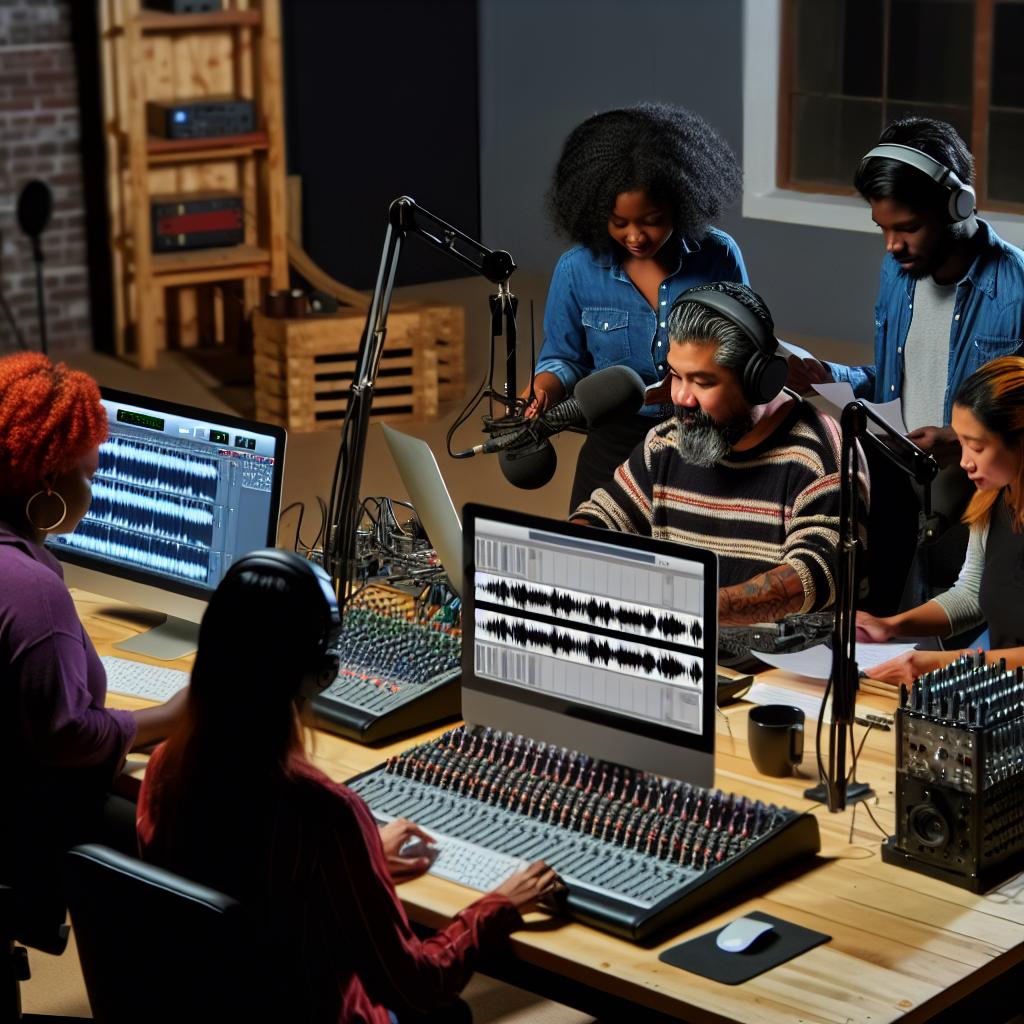Introduction
Podcast production teams consist of various roles, including hosts, producers, editors, and sound engineers.
Each member brings unique skills to the table.
Effective teamwork maximizes creativity and enhances the overall quality of the podcast.
Collaboration is vital to ensure a seamless production process.
When team members communicate openly, they share ideas and provide constructive feedback.
This cooperation fosters a positive environment, leading to innovative solutions.
By working closely, teams can streamline workflows and meet tight deadlines more effectively.
Therefore, understanding collaboration tips can significantly improve your podcasting efforts.
Key Collaboration Tips
First, establish clear roles and responsibilities within the team.
Each member should know their specific duties, which prevents overlap and confusion.
Next, hold regular meetings to discuss progress and brainstorm ideas.
These meetings create a space for open dialogue and creative brainstorming.
Use collaborative tools to keep everyone on the same page.
Platforms such as Trello, Slack, or Google Drive enhance communication and organization.
Ensure that all team members remain engaged and informed by sharing updates and resources.
This practice nurtures accountability and keeps workflow consistent.
Encourage constructive feedback among team members.
Provide a safe environment for sharing thoughts openly.
When team members feel comfortable giving and receiving critiques, the final product improves.
Celebrate each person’s contributions to strengthen team morale further.
Transform Your Career Today
Unlock a personalized career strategy that drives real results. Get tailored advice and a roadmap designed just for you.
Start NowFinally, remain adaptable.
Podcast production can be unpredictable, and plans may change.
Embrace flexibility and adjust to new circumstances swiftly.
By understanding and implementing these collaboration tips, your podcast production team can work more efficiently and produce high-quality content.
Define Each Team Member’s Role
In a podcast production team, clarity is vital.
Each team member should know their specific role within the group.
This understanding promotes efficiency and accountability.
Key roles in a podcast production team often include:
- Host: The primary voice of the podcast, guiding discussions and engaging listeners.
- Producer: Oversees the overall production process and organizes logistical elements.
- Editor: Responsible for post-production tasks, including sound editing and finalizing episodes.
- Sound Engineer: Manages audio quality, ensuring clear sound throughout recording.
- Researcher: Gathers information, topics, and potential guests for episodes.
- Marketing Manager: Develops promotional strategies and manages social media outreach.
When you outline these roles clearly, everyone can focus on their tasks.
This strategy minimizes confusion and redundancy.
Team members can also leverage their unique skills more effectively.
Set Clear Expectations
Establishing clear expectations is crucial for maintaining productivity.
When members know what is expected, they can plan and execute their tasks effectively.
Consider these strategies for setting expectations:
- Regular Meetings: Hold weekly or bi-weekly meetings to review progress and plan future tasks.
- Documentation: Maintain a shared document or project management tool that outlines goals and deadlines.
- Feedback Loops: Create a culture of constructive feedback to address issues and celebrate successes.
- Goal Setting: Collaboratively establish short-term and long-term goals relevant to each role.
- Accountability Systems: Implement systems to track progress and hold team members accountable for their tasks.
These strategies enhance communication and accountability.
When everyone understands their tasks, the production process becomes smoother.
Ensure Understanding of Roles and Responsibilities
Even with defined roles and set expectations, ensuring understanding remains critical.
Team members should not only know their responsibilities but also understand how their roles contribute to the team’s objectives.
To reinforce understanding, consider these methods:
Showcase Your Business Today
Reach thousands of readers actively exploring professional services. Publish your business profile and grow your audience now.
Publish Now- Role Descriptions: Create detailed role descriptions that highlight key responsibilities and contributions.
- Onboarding Sessions: Conduct comprehensive onboarding sessions for new team members, explaining the dynamics within the team.
- Cross-Training: Allow team members to learn about other roles, encouraging flexibility and mutual support.
- Team-building Activities: Organize activities to build rapport and foster collaboration among team members.
- Open Communication Channels: Promote an environment where team members can ask questions and request clarification.
By prioritizing understanding, the team fosters cohesion and better collaboration.
When everyone is on the same page, the creative process thrives.
Additional Best Practices
While establishing roles and expectations constitutes the foundation, you can adopt additional best practices to enhance collaboration further.
Implementing these practices strengthens the team’s overall performance.
- Use Collaboration Tools: Leverage tools like Slack, Trello, or Asana to facilitate communication and task management.
- Develop a Production Schedule: Create a detailed production schedule outlining important dates and milestones for each episode.
- Encourage Creativity: Provide team members the freedom to contribute ideas or suggest changes for improvement.
- Regular Check-Ins: Schedule frequent check-ins to assess workloads and address potential challenges promptly.
- Celebrate Achievements: Acknowledge individual and team accomplishments to boost morale and motivation.
Integrating these best practices can significantly improve team dynamics and project outcomes.
They foster a productive, creative, and engaged podcast production environment.
Effective Collaboration for Podcast Success
Success in podcast production relies heavily on effective collaboration.
Clear role definitions, established expectations, and enhanced understanding are all key components of a functioning team.
By adopting these strategies, you can create an environment that thrives on teamwork and creativity.
Focus on consistent communication and continuous improvement.
Embrace each team member’s strengths and contributions.
With effort and dedication, your podcast production team can achieve exceptional results.
Effective Communication in Podcast Production
Effective communication serves as the backbone for any successful podcast production team.
Without clear and open channels, misunderstandings can arise quickly.
Ensuring that everyone on the team feels heard fosters a collaborative spirit.
Below, we explore several strategies to enhance communication within your podcast team.
Maintain Open Channels of Communication
Open communication involves transparency and honesty among team members.
This creates an environment where individuals can freely share ideas and concerns.
Here are some tips to foster open communication:
- Encourage feedback: Regularly ask for input from team members. This approach allows everyone to voice their thoughts.
- Be approachable: Create a culture where team members feel comfortable sharing their ideas. Leadership should remain accessible at all times.
- Practice active listening: When someone speaks, give them your full attention. Acknowledge their contributions to make them feel valued.
- Use multiple channels: Different people prefer different communication methods. Utilize email, chat apps, and video calls as necessary.
- Set communication guidelines: Establish rules that encourage respectful and constructive conversations. This creates a safe space for collaboration.
Use Project Management Tools
Adopting project management tools significantly enhances organization and productivity.
Such tools provide a structured way to collaborate on tasks and deadlines.
Below are popular project management tools that can aid your podcast production:
- Trello: This visual tool uses boards and cards to organize tasks. It allows team members to track progress easily.
- Asana: Asana helps teams assign tasks and due dates. It serves as a central hub for your project workflow.
- Slack: While primarily a communication tool, Slack can manage projects through channels and integrations. It keeps all discussions in one place.
- Monday.com: This tool offers customizable workflows and progress tracking. Its visual layout aids in understanding project timelines.
- ClickUp: ClickUp combines task management with docs and goals. Its versatility meets various project needs effectively.
Choosing the right tool for your team depends on your specific needs.
Evaluate what features best fit your workflow.
Implementing a project management tool streamlines communication and keeps everyone accountable.
Schedule Regular Meetings
Regular meetings serve as a cornerstone for team cohesion.
They provide team members with dedicated time to discuss progress.
Here are some guidelines for effective meeting scheduling:
- Set a consistent schedule: Determine a regular day and time for meetings. Consistency builds anticipation and commitment.
- Prepare an agenda: Draft a clear agenda before each meeting. This helps maintain focus and productivity during discussions.
- Limit meeting time: Keep meetings short and efficient. Aim for a duration of 30 to 60 minutes to maintain engagement.
- Encourage participation: Actively invite everyone to contribute during meetings. This inclusivity fosters team unity.
- Outline action items: After each meeting, summarize what was discussed. Clearly define the next steps to ensure accountability.
Regular meetings not only enhance accountability but also allow for the swift identification of any issues.
Consistent communication provides a platform for brainstorming solutions collaboratively.
Facing Challenges Together
Effective communication helps teams overcome challenges that arise during podcast production.
Whether it’s tight deadlines or creative blockades, staying united strengthens resilience.
Addressing problems promptly ensures that progress continues smoothly.
- Identify challenges early: Encourage team members to share concerns as soon as they arise. This proactive approach prevents minor issues from escalating.
- Collaborate on solutions: Involve the team in brainstorming sessions. Collective problem-solving often yields innovative solutions.
- Assign roles clearly: Ensure that everyone knows their responsibilities. Clear role definition reduces ambiguity and confusion.
- Stay positive: Maintain an optimistic mindset during challenges. A positive attitude promotes a resilient and motivated team.
- Celebrate small victories: Acknowledge achievements regularly, no matter how small. Celebrating successes motivates continued progress.
Overcoming challenges together not only strengthens team bonds but also enhances creativity in podcast production.
Enhancing Team Dynamics
To foster a collaborative atmosphere, it’s essential to consider the dynamics within your team.
Team dynamics significantly impact how communication flows.
Below are strategies that can enhance team dynamics:
- Build trust: Trust forms the foundation of effective teams. Team members should cultivate trust through honesty and accountability.
- Encourage diversity: A diverse team brings a range of perspectives. Encourage different voices to contribute their unique experiences.
- Foster empathy: Encourage team members to understand each other’s perspectives. Empathy contributes to a supportive team environment.
- Promote collaboration: Create opportunities for team-building activities. These activities improve relationships and foster cooperation.
- Provide support: Ensure team members have the resources they need. Providing assistance helps them focus on their creative tasks.
Enhancing team dynamics leads to more productive and enjoyable collaboration within your podcast production team.
Discover More: Writing Press Releases: A Guide for Communications Directors
Creating a Podcast in a Collaborative Environment
Creating a podcast is a collaborative effort that thrives on creativity and collective insights.
Showcase Your Business Today
Reach thousands of readers actively exploring professional services. Publish your business profile and grow your audience now.
Publish NowTo ensure your team members feel valued and engaged, fostering a creative and inclusive environment is essential.
Here are effective strategies to achieve this:
Encourage Team Members to Share Ideas
Encouraging active participation helps to spark innovation.
When each member contributes their thoughts, it leads to fresh ideas and approaches.
Consider these techniques to promote idea-sharing:
-
Regular Brainstorming Sessions: Schedule regular meetings focused on brainstorming. This dedicated time allows everyone to freely express their thoughts.
-
Idea Submission Box: Set up a virtual or physical idea box. Team members can anonymously submit ideas they might hesitate to share openly.
-
Rotating Roles: Assign different roles during production meetings. Let each team member lead discussions on their expertise or interests.
-
Encourage Collaborative Projects: Pair up team members to work on specific segments. This collaboration promotes diverse perspectives and strengthens teamwork.
Active encouragement can lead to remarkable creativity within the team.
Celebrate contributions, no matter how big or small.
Recognizing efforts can boost morale and inspire continued participation.
Value Diversity within the Team
Diversity is a powerful catalyst for creativity.
Different life experiences and backgrounds can lead to innovative storytelling.
Here are ways to ensure your team embraces diversity:
-
Recruit Diverse Talent: Aim to bring on team members from various backgrounds. Different perspectives enrich the creative process.
-
Celebrate Cultural Events: Acknowledge and celebrate cultural events relevant to team members. This creates an open dialogue about identity and experiences.
-
Diverse Content Ideas: Encourage the exploration of topics from various cultural lenses. This practice can lead to unique angles and engaging narratives.
-
Inclusive Decision-Making: Involve team members in decision-making processes. Recognizing all voices allows for a holistic approach to production.
Maintaining a diverse team opens doors to new ideas and approaches.
It fosters creativity and enhances the authenticity of the podcast’s content.
Create a Safe Space for Feedback
Feedback is vital for growth, but it must come from a place of support.
A safe space for open and honest feedback promotes improvement.
Here are methods to cultivate this environment:
-
Establish Clear Guidelines: Set clear expectations regarding feedback. Let team members know that constructive critique is beneficial.
-
Encourage Positive Reinforcement: Promote a culture of support by highlighting what team members do well. This balance fosters openness.
-
Facilitate One-on-One Check-Ins: Schedule regular individual meetings. One-on-one time encourages candid conversations about strengths and areas for improvement.
-
Utilize Anonymous Surveys: Occasionally, use anonymous surveys to gather feedback. This anonymity can lead to more honest responses.
Creating an environment that welcomes feedback takes time but is rewarding.
Team members need to feel secure in sharing their thoughts without fear of repercussions.
Embrace Flexibility and Adaptability
An inclusive and creative environment requires flexibility.
Teams should adapt to different working styles and preferences.
Consider these strategies:
-
Flexible Working Hours: Allow team members to work at hours that suit them best. Flexibility can increase productivity and satisfaction.
-
Remote Collaboration Tools: Make use of digital collaboration tools. These can help bridge gaps when team members can’t meet in person.
-
Adapt to Individual Strengths: Recognize and utilize each member’s strengths. This ensures that tasks align with their skills and passions.
-
Encourage Trial and Error: Allow team members to experiment with new ideas. Learning through trial and error can yield unexpected breakthroughs.
Flexibility can enhance creativity and foster a sense of ownership over the work.
Embracing adaptability motivates team members to contribute more actively.
Celebrate Achievements Together
Celebrating milestones contributes to a positive team environment.
Acknowledging achievements, both big and small, reinforces teamwork and dedication.
Use the following methods:
-
Host Celebration Events: Organize events or casual get-togethers after major milestones. Celebrations strengthen team bonds and create lasting memories.
-
Highlight Contributions: Regularly recognize individual contributions in team meetings. Public acknowledgment reinforces everyone’s role in the success.
-
Set Up Incentives: Consider offering small rewards for achievements. Incentives can motivate team members to strive even harder.
-
Share Success Stories: Share stories of success in newsletters or social media. This larger acknowledgment can elevate the team’s morale.
Celebration creates an enjoyable atmosphere within the team.
Fostering a sense of accomplishment encourages others to engage in the creative process.
Provide Opportunities for Professional Development
Investing in professional development can enhance both individual and team capabilities.
When team members grow, so does the podcast’s quality.
Focus on these areas:
-
Workshops and Training: Host workshops on relevant skills like editing, storytelling, or marketing.
-
Encourage Networking: Provide opportunities for team members to network. Building relationships within the industry opens new avenues for collaboration.
-
Share Resources: Suggest books, articles, or courses that can benefit the team. Effective resources can inspire new ideas and techniques.
-
Support Goal-Setting: Help team members set professional development goals. Mentoring supports growth and fosters the team atmosphere.
Professional development fosters a culture of continuous improvement.
It shows team members that their growth and success matter.
Ultimately, fostering a creative and inclusive environment enhances collaboration in podcast production.
Encourage idea-sharing, celebrate diversity, and create safe spaces for feedback.
By embracing flexibility and celebrating achievements, your team will thrive creatively and cohesively.
Investing in the development of your team members reflects a commitment to excellence in podcasting.
Together, these strategies will elevate your podcast and ensure its success.
Uncover the Details: Strategies for Managing Marketing Budgets
Collaboration is vital in podcast production.
Showcase Your Business Today
Reach thousands of readers actively exploring professional services. Publish your business profile and grow your audience now.
Publish NowIt transforms individual efforts into a cohesive audio experience.
Teams that work together can elevate their content.
By engaging in joint creativity, they emphasize the collective talent among team members.
Here are some practical ways to enhance collaboration in content creation.
Brainstorm Ideas Together as a Team
Brainstorming sessions can ignite creativity within your team.
Bringing everyone together fosters an environment of open communication.
Here are some effective strategies for a productive brainstorming session:
- Set Clear Objectives: Define what you want to achieve from the session. Clear goals streamline discussions.
- Create a Comfortable Environment: Allow members to express themselves freely. A relaxed atmosphere encourages creativity.
- Encourage Diverse Input: Invite team members from different backgrounds. Diverse perspectives can lead to unique ideas.
- Utilize Visual Aids: Use whiteboards or digital tools to illustrate ideas. Visuals can clarify complex thoughts and stimulate discussion.
- Limit Criticism: In the initial stages, focus on idea generation. Avoid critiquing ideas until the brainstorming phase concludes.
- Record Ideas: Document every idea shared. This creates a valuable resource for future reference.
- Follow-Up: After brainstorming, review and prioritize the best ideas. Ensure all team members are involved in the selection process.
Collaborate on Scripting and Editing Episodes
Co-writing scripts can unify the direction of your podcast.
Collaboration on scripting allows team members to contribute different strengths and styles.
Here’s how to effectively co-write and edit episodes:
- Determine Roles: Assign responsibilities for each part of the script. This includes research, writing, and revising.
- Establish a Template: Create a shooting script template. This standardizes the structure and flow of your episodes.
- Write in Small Segments: Break down the script into manageable sections. This approach makes collaboration smoother.
- Use Collaborative Tools: Utilize software like Google Docs. This allows real-time editing and easy feedback.
- Schedule Regular Meetings: Discuss scripts as a group. This builds accountability and helps clarify collective ideas.
- Incorporate Sound Bites: Share potential sound clips or quotes during the writing process. This enriches the content with relevant audio highlights.
- Revise Together: Edit the script as a group. Collaborative revisions can significantly enhance clarity and impact.
Incorporate Feedback from Team Members to Improve Content Quality
Feedback plays a crucial role in refining content quality.
Constructive criticism helps identify areas for improvement.
Here are effective ways to incorporate feedback:
- Create a Feedback Loop: Regularly ask for input from the team. Implement structured processes for giving and receiving feedback.
- Foster a Supportive Atmosphere: Promote an environment where team members feel comfortable sharing feedback. Positive reinforcement encourages honesty.
- Use Anonymous Surveys: Collect feedback anonymously when appropriate. This allows more candid responses.
- Host Review Sessions: Schedule periodic meetings to review episodes. Discuss strengths and weaknesses as a team.
- Act on Feedback: Prioritize implementing suggested changes. Showing that feedback leads to action builds trust and loyalty.
- Celebrate Improvements: Acknowledge areas where feedback made a difference. Recognizing efforts boosts morale and encourages continued participation.
- Keep Communication Open: Allow team members to communicate ongoing observations. Continual dialogue enhances collaborative improvements.
Effective collaboration in content creation directly impacts the quality of your podcast.
By brainstorming ideas as a team, co-writing scripts, and incorporating feedback, you create a cycle of improvement.
Each step fosters a supportive environment, leading to richer content and enhanced teamwork.
Embrace the collective creativity within your podcast production team.
This approach not only enriches the quality of your episodes but also strengthens team dynamics.
Invest time and effort in these collaborative practices.
Your podcast will not only reflect the creativity of individual team members but also shine as a collective endeavor.
With commitment and cooperation, the sky’s the limit for your podcast’s success.
Always remember, teamwork makes the dream work!
Discover More: Advertising Copywriting: Key Metrics to Track

Embrace Feedback and Constructive Criticism
In the world of podcast production, collaboration is essential.
It allows teams to share ideas and enhance creativity.
One of the key elements of successful teamwork is the ability to embrace feedback and constructive criticism.
By fostering a culture of open communication, teams can thrive, grow, and continually improve their podcast content.
Here’s how your production team can effectively implement this practice.
Provide Feedback in a Constructive and Respectful Manner
When offering feedback, it is crucial to approach it thoughtfully.
Constructive criticism helps elevate the quality of the podcast.
Here are some tips for giving effective feedback:
-
Be Specific: Instead of vague comments, pinpoint what worked well and what didn’t.
-
Focus on the Work: Always critique the podcast episode, not the person who created it.
-
Offer Solutions: Alongside criticism, provide potential solutions or alternatives.
-
Practice Active Listening: When discussing feedback, listen carefully to responses.
-
Acknowledge Strengths: In addition to areas for improvement, highlight what the team did well.
By adhering to these guidelines, team members can create an environment where feedback is welcomed.
Constructive and respectful feedback breeds trust, allowing everyone to feel valued and heard.
Be Open to Receiving Feedback from Team Members
Feedback is not a one-way street.
Everyone on the team should be willing to receive input.
Accepting feedback gracefully is crucial for personal and professional growth.
Here are some strategies for encouraging this openness:
-
Cultivate a Growth Mindset: View feedback as an opportunity to improve.
-
Stay Receptive: Instead of feeling defensive, approach feedback with curiosity.
-
Ask for Specifics: When receiving feedback, ask clarifying questions.
-
Express Gratitude: Thank your peers for their feedback, regardless of how challenging it may be.
-
Implement Changes: Take action based on the feedback.
By being open to receiving feedback, team members can embrace opportunities to learn.
This openness fosters a culture where all voices matter, enhancing collaboration.
Use Feedback to Continually Improve and Grow as a Team
An effective podcast production team utilizes feedback not just for individuals but for the entire group.
Showcase Your Business Today
Reach thousands of readers actively exploring professional services. Publish your business profile and grow your audience now.
Publish NowBy synthesizing feedback, the team can refine its processes and enhance overall performance.
Here’s how to leverage feedback for continuous improvement:
-
Schedule Regular Reviews: Set aside time to evaluate past episodes and gather feedback.
-
Document Feedback: Keep a record of received feedback and suggested changes.
-
Prioritize Areas for Improvement: Identify common themes in feedback.
-
Celebrate Successes: When implementing feedback leads to improvements, celebrate these victories.
-
Course Correct: When feedback indicates a direction change, be willing to adapt.
By using feedback as a guide, teams can focus on refining their craft.
This continuous loop of improvement benefits everyone involved, especially the podcast’s listening audience.
Fostering a Feedback Culture for Podcast Success
Incorporating feedback and constructive criticism into your podcast production process is essential for success.
By providing feedback constructively, being receptive to input, and using feedback for team growth, you create an environment ripe for collaboration.
Ultimately, this culture of communication leads to the production of outstanding podcast content.
Your team not only benefits from individual enhancement but also fosters collective growth.
As a result, your podcast thrives, leading to a more engaged and loyal audience base.
Explore Further: Understanding Film Theory: A Guide for Critics
Effective delegation is crucial for a successful podcast production team.
Assigning tasks based on individual strengths allows for a smoother workflow.
When team members focus on what they do best, the quality of the production improves significantly.
Here’s how to delegate tasks effectively within your team.
Distribute Tasks Based on Team Members’ Strengths and Expertise
Understanding the unique skills of your team members is essential for effective task distribution.
Each member comes with different talents, experiences, and interests.
Here’s how to identify strengths and assign tasks accordingly:
- Conduct Skill Assessments: Evaluate the skills of each team member regularly. Use informal surveys or discussions, and ask about their preferences and comfort levels.
- Foster Open Communication: Create an environment that encourages team members to share their strengths. Regular check-ins and feedback sessions help in recognizing individual capabilities.
- Map Skills to Tasks: Once you understand your team’s strengths, align specific tasks with those skills. For instance, if someone excels in audio editing, assign them that responsibility.
- Rotate Responsibilities: Occasionally rotate tasks among team members. This practice exposes everyone to different roles, fostering broader skill development.
- Document Strengths: Keep a record of team members’ skills along with the tasks they perform best. Regularly update this document to reflect any new expertise gained.
Avoid Micromanaging and Trust Team Members to Complete Their Tasks
Micromanagement can stifle creativity and demotivate team members.
Trust your team to handle their responsibilities, which is crucial for a healthy production environment.
- Set Clear Expectations: Clearly define goals and timelines. Ensure each team member knows what is expected of them.
- Empower Autonomy: Allow team members to complete their tasks in their way. Encourage them to innovate and handle challenges independently.
- Choose the Right Tools: Utilize project management tools to track progress without hovering. Software like Trello or Asana can facilitate task management effectively.
- Provide Necessary Resources: Ensure everyone has access to the tools and training they need. This support can build confidence and promote self-sufficiency.
- Practice Feedback Loops: Schedule regular feedback sessions to discuss progress. This approach builds trust without crossing into micromanagement territory.
Monitor Progress and Offer Support When Needed
Monitoring progress is essential, but it must be done thoughtfully.
Support and guidance can help maintain productivity without smothering creativity.
- Use Check-in Meetings: Hold brief weekly or bi-weekly meetings. Discuss updates, roadblocks, and achievements as a team.
- Encourage Open Dialogue: Foster a culture where team members feel comfortable sharing challenges. Open communication can surface issues before they escalate.
- Be Approachable: Make sure team members feel comfortable reaching out. Let them know that you are available for support and guidance.
- Track Milestones: Establish milestones for long-term projects. This clarity helps everyone stay focused and allows for easier monitoring.
- Recognize Achievements: Celebrate successes, both big and small. Recognizing hard work boosts morale and encourages continued effort.
Delegating tasks effectively transforms your podcast production.
Following these steps fosters collaboration and enhances productivity among team members.
A balanced team dynamic thrives when members feel empowered in their roles.
Delegation is not just about distribution; it is about creating a supportive environment.
By leveraging the strengths and expertise of your team members, you can streamline processes while minimizing stress.
Trust your team, avoid micromanagement, and stay engaged without overwhelming them.
With these strategies in place, your podcast production team will flourish.
Collaboration in Podcast Production
In the ever-evolving world of podcasting, collaboration plays a crucial role in ensuring quality production.
Effective teamwork transforms ideas into compelling content.
Each member brings unique skills and perspectives that enhance the final product.
We have discussed several key tips to foster collaboration within podcast production teams.
First, establish clear roles and responsibilities.
When everyone knows their tasks, the workflow becomes smoother.
Transparency in communication is essential.
Regular check-ins help keep everyone informed and aligned with the project goals.
Secondly, embrace creative brainstorming sessions.
These gatherings ignite fresh ideas and connect team members.
Encourage open dialogue where all voices matter.
This inclusion nurtures a sense of belonging within the team.
Showcase Your Business Today
Reach thousands of readers actively exploring professional services. Publish your business profile and grow your audience now.
Publish NowThirdly, utilize collaborative tools and technology.
Platforms such as Slack, Trello, or Asana streamline project management and enhance communication.
These tools enable real-time collaboration, making it easier to share ideas and feedback.
Moreover, establish a shared vision.
A collective understanding of the podcast’s direction inspires and motivates team members.
Regularly revisit this vision to ensure everyone remains aligned.
Lastly, celebrate achievements together.
Acknowledge milestones and express gratitude for each member’s contributions.
This recognition fosters a positive environment, encouraging further cooperation.
Collaboration in podcast production is vital for creating engaging content.
By implementing these tips, teams can enhance their workflow and creativity.
Strong teamwork leads to richer narratives and a more enjoyable process.
As we continue to navigate the podcasting landscape, let us commit to ongoing collaboration.
Together, we can elevate our productions while enjoying the journey along the way.
Additional Resources
Media Studies and Production Major | Temple University
Communications (COMM) | Penn State
[E-Books for Sale]
The Big Book of 500 High-Paying Jobs in America: Unlock Your Earning Potential
$19.99 • 500 High-Paying Jobs • 330 pages
Explore 500 high-paying jobs in America and learn how to boost your career, earn more, and achieve success!
See All 500 High-Paying Jobs of this E-Book
1001 Professions Without a Degree: High-Paying American Jobs You Can Start Now
$19.99 • 1001 Professions Without a Degree • 174 pages
Discover 1001 high-paying jobs without a degree! Unlock career tips, skills, and success strategies for just $19.99!




